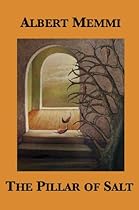The Pillar of Salt

| Author | : | |
| Rating | : | 4.47 (793 Votes) |
| Asin | : | B00D50BA7E |
| Format Type | : | |
| Number of Pages | : | 481 Pages |
| Publish Date | : | 2017-11-22 |
| Language | : | English |
DESCRIPTION:
When The Pillar of Salt was first published in 1953, it caused a scandal in Tunis. “The Pillar of Salt reads like a general indictment,” Memmi writes in a new introduction to this 2013 eBook edition.This is an unusual man’s coming of age story and a document about a community that has now all but disappeared.“The grave torment of the truly homeless is the theme of Albert Memmi's mature, thoughtful book His father an Italian Jew, his mother a Berber, Benillouche struggles on the tattered fringe of the Tunisian ghetto for the very air he breathes Beneath this account of privation, there is a more deeply harrowing realization on the part of the protagonist that he belongs nowhere.” — New York Times“In the Celine-Sartre-Camus tradition of the contemporary French novel of despair, this autobiographical narrative has maturity, stylistic grace, and purpose A thoughtful, perceptive work.” — Library Journal“Told with clarity of vision, a passionate sense of justice, and a warm heart.” — New York Herald Tribune. Acclaimed sociologist Albert Memmi, the son of poor Jewish parents who lived at the edge of the equally poor Jewish and Muslim quarters, wrote candidly about the life of Tunisia’s small Jewish community and the failings of the tiny local bourgeoisie, “which thought itself opulent but was only ridiculous.” Memmi was no less critica
"fine literature" according to M Kairey. This (semi)autobiographical book was written in the mid fifties. It deserves to be plucked from obscurity and placed among the better novels of the 20th century. Artful prose tells the story of a boy growing up in colonial Tunis. He is at the crossroads of Jewish, French, African and Moslem/Arab culture. He is unable to assimilate all these influences into his life, so he rejects his background and is left with a void he cannot fill. Highly recommended.. "Fabulous Book" according to Thomas Grammer. This is a great book about the life of an African Jew covering pre and postwar France. Compelling and thought provoking!. "Well-written novel that reads like a memoir" according to E. Smiley. This is a well-written novel about the life of a Jewish Tunisian boy, growing up in the years leading up to WW2. It is generally considered to be autobiographical, and though the narrator’s name is not the author’s, it reads more like a memoir than a novel: it records Alexandre’s memories and thoughts about his life, but has few if any traditional scenes and very little dialogue or physical description; the detail is primarily emotional. And yet, the specific incidents that make up the narrator’s experiences feel drawn from life, rather than the types of occ
From Publishers Weekly Alexandre Mordekhai Benillouche, Memmi's young hero and narrator, is a Jewish native of French-colonized Tunisia. His rich description of ``the almond bitterness of blackened calfskins'' in his father's tanning shop, among other things, betrays Memmi's nostalgia for his own childhood in a Tunis ghetto. Memmi's ( The Colonizer and the Colonized ) long-out-of-print semiautobiographical novel powerfully distinguishes itself through its unblinking examination of the contradictions that thwart even Alexandre's most altruistic ambitions. After volunteering to work in a labor camp during WW II, Alexandre discovers that the class and ethnic distinctions haunting him continu
